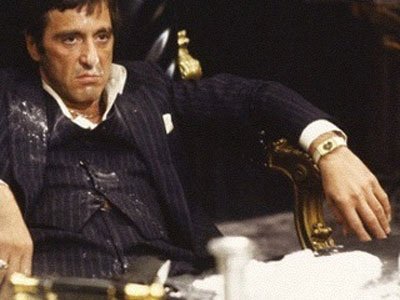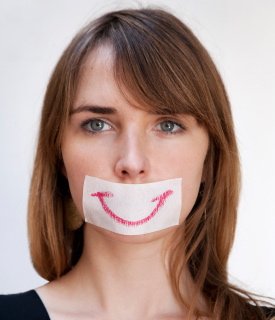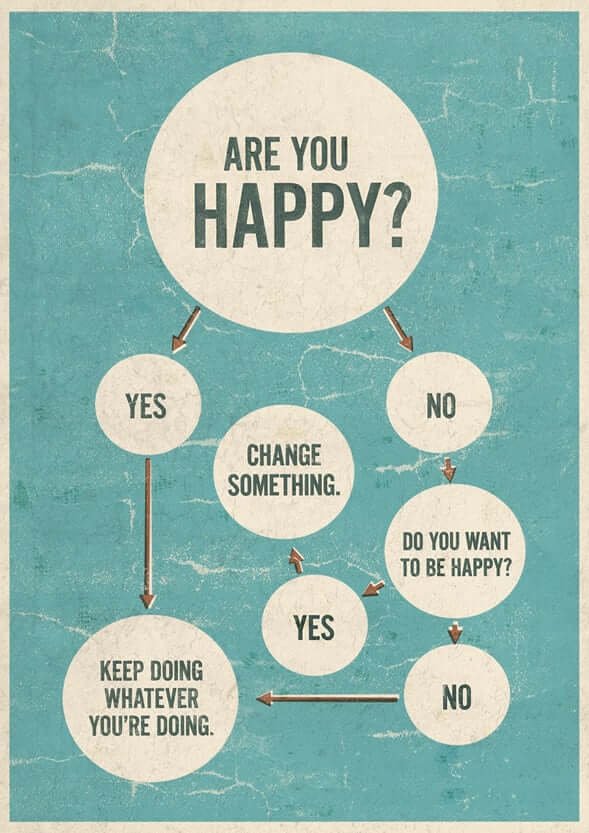STOP TRYING TO BE HAPPY
If you have to try to be cool, you will never be cool. If you have to try to be happy, then you will never be happy. Maybe the problem these days is people are just trying too hard.
Happiness, like other emotions, is not something you obtain, but rather something you inhabit. When you’re raging pissed and throwing a socket wrench at the neighbor’s kids, you are not self-conscious about your state of anger. You are not thinking to yourself, “Am I finally angry? Am I doing this right?” No, you’re out for blood. You inhabit and live the anger. You are the anger. And then it’s gone.
Just as a confident man doesn’t wonder if he’s confident, a happy man does not wonder if he’s happy. He simply is.
What this implies is that happiness is not achieved in itself, but rather it is the side effect of a particular set of ongoing life experiences. This gets mixed up a lot, especially since happiness is marketed so much these days as a goal in and of itself. Buy X and be happy. Learn Y and be happy. But you can’t buy happiness and you can’t achieve happiness. It just is. And it is once you get other parts of your life in order.
HAPPINESS IS NOT THE SAME AS PLEASURE

Tony Montana didn't seem too happy.
Tony Montana didn’t seem too happy.
When most people seek happiness, they are actually seeking pleasure: good food, more sex, more time for TV and movies, a new car, parties with friends, full body massages, losing 10 pounds, becoming more popular, and so on.
But while pleasure is great, it’s not the same as happiness. Pleasure is correlated with happiness, but does not cause it. Ask any drug addict how their pursuit of pleasure turned out. Ask an adulterer who shattered her family and lost her children whether pleasure ultimately made her happy. Ask a man who almost ate himself to death how happy pursuing pleasure made him feel.
Pleasure is a false god. Research shows that people who focus their energy on materialistic and superficial pleasures end up more anxious, more emotionally unstable and less happy in the long-run. Pleasure is the most superficial form of life satisfaction and therefore the easiest. Pleasure is what’s marketed to us. It’s what we fixate on. It’s what we use to numb and distract ourselves. But pleasure, while necessary, isn’t sufficient. There’s something more.
HAPPINESS DOES NOT REQUIRE LOWERING ONE’S EXPECTATIONS
A popular narrative lately is that people are becoming unhappier because we’re all narcissistic and grew up being told that we’re special unique snowflakes who are going to change the world and we have Facebook constantly telling us how amazing everyone else’s lives are, but not our own, so we all feel like crap and wonder where it all went wrong. Oh, and all of this happens by the of age 23.
Sorry, but no. Give people a bit more credit than that.
For instance, a friend of mine recently started a high-risk business venture. He dried up most of his savings trying to make it work and failed. Today, he’s happier than ever for his experience. It taught him many lessons about what he wanted and didn’t want in life and it eventually led him to his current job, which he loves. He’s able to look back and be proud that he went for it because otherwise he would have always wondered “what if?” and that would have made him unhappier than any failure would have.
The failure to meet our own expectations is not antithetical to happiness, and I’d actually argue that the ability to fail and still appreciate the experience is actually a fundamental building block for happiness.
If you thought you were going to make $100,000 and drive a Porsche immediately out of college, then your standards of success were skewed and superficial, you confused your pleasure for happiness, and the painful smack of reality hitting you in the face will be one of the best lessons life ever gives you.
The “lower expectations” argument falls victim to the same old mindset: that happiness is derived from without. The joy of life is not having a $100,000 salary. It’s working to reach a $100,000 salary, and then working for a $200,000 salary, and so on.
So, I say raise your expectations. Elongate your process. Lay on your death bed with a to-do list a mile long and smile at the infinite opportunity granted to you. Create ridiculous standards for yourself and then savor the inevitable failure. Learn from it. Live it. Let the ground crack and rocks crumble around you because that’s how something amazing grows, through the cracks.
HAPPINESS IS NOT THE SAME AS POSITIVITY

fake-smileChances are you know someone who always appears to be insanely happy regardless of the circumstances or situation. Chances are this is actually one of the most dysfunctional people you know. Denying negative emotions leads to deeper and more prolonged negative emotions and emotional dysfunction.
It’s a simple reality: shit happens. Things go wrong. People upset us. Mistakes are made and negative emotions arise. And that’s fine. Negative emotions are necessary and healthy for maintaining a stable baseline happiness in one’s life.
The trick with negative emotions is to 1) express them in a socially acceptable and healthy manner and 2) express them in a way which aligns with your values.
Simple example: A value of mine is to pursue non-violence. Therefore, when I get mad at somebody, I express that anger, but I also make a point to not punch them in the face. Radical idea, I know. (But I absolutely will throw a socket wrench at the neighbor’s kids. Try me.)
There’s a lot of people out there who subscribe to “always be positive” ideology. These people should be avoided just as much as someone who thinks the world is an endless pile of shit. If your standard of happiness is that you’re always happy, no matter what, then you’ve been watching way too much Leave It To Beaver and need a reality check (but don’t worry, I promise not to punch you in the face).
I think part of the allure of obsessive positivity is the way which we’re marketed to. I think part of it is being subjected to happy, smiley people on television constantly. I think part of it are some people in the self-help industry that want you to feel like there’s something wrong with you all the time.
Or maybe it’s just that we’re lazy, and like anything else we want the result without actually having to do the hard work for it.
Which brings me to what actually drives happiness….
HAPPINESS IS THE PROCESS OF BECOMING YOUR IDEAL SELF
Completing a marathon makes us happier than eating a chocolate cake. Raising a child makes us happier than beating a video game. Starting a small business with friends and struggling to make money makes us happier than buying a new computer.
And the funny thing is that all three of the activities above are exceedingly unpleasant and require setting high expectations and potentially failing to always meet them. Yet, they are some of the most meaningful moments and activities of our lives. They involve pain, struggle, even anger and despair, yet once we’ve done them we look back and get misty-eyed about them.
Why?
Because it’s these sort of activities which allow us to become our ideal selves. It’s the perpetual pursuit of fulfilling our ideal selves which grants us happiness, regardless of superficial pleasures or pain, regardless of positive or negative emotions. This is why some people are happy in war and others are sad at weddings. It’s why some are excited to work and others hate parties. The traits they’re inhabiting don’t align with their ideal selves.
The end results don’t define our ideal selves. It’s not finishing the marathon that makes us happy, it’s achieving a difficult long-term goal that does. It’s not having an awesome kid to show off that makes us happy, but knowing that you gave yourself up to the growth of another human being that is special. It’s not the prestige and money from the new business that makes you happy, it’s the process of overcoming all odds with people you care about.
And this is the reason that trying to be happy inevitably will make you unhappy. Because to try to be happy implies that you are not already inhabiting your ideal self, you are not aligned with the qualities of who you wish to be. After all, if you were acting out your ideal self, then you wouldn’t feel the need to try to be happy.
Cue statements about “finding happiness within,” and “knowing that you’re enough.” It’s not that happiness itself is in you, it’s that happiness occurs when you decide to pursue what’s in you.
And this is why happiness is so fleeting. Anyone who has set out major life goals for themselves, only to achieve them and realize that they feel the same relative amounts of happiness/unhappiness, knows that happiness always feels like it’s around the corner just waiting for you to show up. No matter where you are in life, there will always be that one more thing you need to do to be extra-especially happy.
And that’s because our ideal self is always just around that corner, always three steps ahead of us. We dream of being a musician and when we’re a musician, we dream of writing a film score and when write a film score, we dream of writing a screenplay. And what matters isn’t that we achieve each of these plateaus of success, but that we’re consistently moving towards them, day after day, month after month, year after year. The plateaus will come and go, and we’ll continue following our ideal self down the path of our lives.
Happiness map

And with that, with regards to being happy, it seems the best advice is also the simplest: Imagine who you want to be and then step towards it. Dream big and then do something. Anything. The simple act of moving at all will change how you feel about the entire process and serve to inspire you further.
Let go of the imagined result — it’s not necessary. The fantasy and the dream are merely tools to get you off your ass. It doesn’t matter if they come true or not. Live, man. Just live. Stop trying to be happy and just be.
meep
I upvoted You